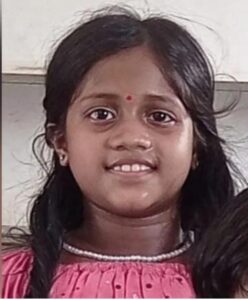The girl, Anaya Sanoop, a Class IV student of Korangad LP School, developed a fever on Wednesday night after attending preparations for her school’s Independence Day celebrations. She died the next day.
Published Aug 16, 2025 | 4:53 PM ⚊ Updated Aug 28, 2025 | 7:57 PM

Brain-eating amoeba Naegleria fowleri. (iStock)
Synopsis: Anaya’s parents filed a police complaint alleging that she was not given timely medical care during the “golden hour” and that the hospital referred her to MCH at the last moment to cover up negligence. Hospital authorities, however, rejected the charges, stating that Anaya was provided the same treatment protocol as other children admitted with fever and vomiting symptoms.
A nine-year-old girl from Thamarassery in Kerala’s Kozhikode district died on Thursday, 14 August, after being diagnosed with amoebic meningoencephalitis, a rare but fatal brain infection, triggering concerns in her locality. Her family alleged that medical negligence had led to her death.
The girl, Anaya Sanoop, a Class IV student of Korangad Lower Primary School, developed a fever on Wednesday night after attending preparations for her school’s Independence Day celebrations.
She was admitted to the Thamarassery Taluk Hospital the next morning, but as her condition worsened, she was shifted to the Government Medical College Hospital (MCH), Kozhikode, where she died later in the day.
A post-mortem examination suggested amoebic meningoencephalitis as the cause of death.
Health officials have since heightened surveillance in Anaya’s ward (Korangad) at the Thamarassery grama panchayat. Two of her siblings and another close relative, who exhibited fever symptoms, were placed under quarantine.
Confirming the findings, Thamarassery grama panchayat health standing committee chairperson Samshida Shafi told South First that water samples from the area had been collected and sent for molecular testing to find the exact source of infection.
“The final confirmation can be made only after the molecular test reports arrive,” she said.
Meanwhile, awareness campaigns and preventive measures have been launched in the locality. Health workers are conducting door-to-door visits, and the pond near Anaya’s house is being tested, though preliminary inquiries revealed she had not entered the pond in recent days.
The child’s death has triggered panic among residents.
The Health Department has urged people to ensure safe drinking water, maintain hygiene, and avoid swimming in contaminated waterbodies until further instructions.
Even as precautionary steps are being taken, the incident has sparked controversy over alleged lapses in treatment at the taluk hospital.
Anaya’s parents, filed a police complaint alleging that she was not given timely medical care during the “golden hour” and that the hospital referred her to MCH at the last moment to cover up negligence.

Anaya Sanoop.
Hospital authorities, however, rejected the charges, stating that Anaya was provided the same treatment protocol as other children admitted with fever and vomiting symptoms.
The hospital superintendent clarified that she was referred to MCH only after her blood count rose sharply and her condition deteriorated, despite all possible support being extended.
Anaya’s body was cremated on Friday, 15 August. Earlier, the body was placed in her school for the public to pay homage. However, health officials restricted public participation as a precautionary measure.
The police have registered a case of “unnatural death” based on the family’s complaint, and further investigation is underway.
Despite the deaths, it’s said that Kerala has made significant strides in reducing the fatality rate of amoebic meningoencephalitis, a rare but highly lethal brain infection caused by free-living amoeba — Naegleria fowleri — found in untreated water.
Globally, the disease carries a mortality rate of 97 percent.
However, through early detection and timely management, the state health department says that it has managed to bring the fatality rate down to 25 percent.
According to the Health Department, Kerala reported 38 cases and eight deaths in 2024. This year, till April, 12 cases and five deaths have been confirmed.
Most infections were found among school children who swam in stagnant or muddied ponds during summer, when amoebic activity is high due to receding water levels.
The government has issued strict preventive guidelines, advising people to avoid mossy or stagnant waterbodies, ensure chlorination in pools and water parks, and take precautions while swimming to prevent water from entering the nostrils. Individuals with a history of nasal or brain surgery are urged to be extra cautious.
To strengthen detection, the State Public Health Laboratory in June developed its own molecular diagnostic test kits capable of identifying five pathogenic amoeba species, including Naegleria fowleri and Acanthamoeba spp., eliminating the need to rely on external labs such as PGI Chandigarh.
Kerala has also devised a “One Health” protocol, bringing together the Health Department, Pollution Control Board, and Kerala University’s Science and Technology Department to combat the disease.
With vigilance and public awareness, officials believe early detection and prevention can save lives.
(Edited by Majnu Babu).
